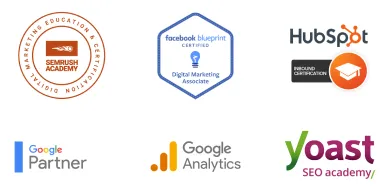TO LEARN IS TO GROW
Learning Center
We do our research and publish our results. Should probably call this the Growing Center.


How Often Should I Blog For My Business?
Blogging is ideal for generating traffic, brand awareness, and SEO positioning. But, how often should I blog for my business? While your business needs to start blogging and do it in the right way, remember that you should be coming up with helpful, high-quality, and market-relevant blog posts as often as you comfortably can.
If you wonder why everyone is blogging now, and what benefits it has for businesses, this article is for you. Let’s start by understanding what blogging is. Basically blogging is creating content of value for an audience and promoting it on a blog.
This is not a new fad, but more and more companies are realizing the benefits of offering articles on their blog for their inbound marketing strategy, to rank in Google search results and to improve their brand awareness.
You already know that it is important to do it, but you may wonder: How should I do? or how often should I blog?
In this article we’ll tackle those queries so you can start blogging today.

Why Is Blogging Important for Businesses?
Consider that your website is your cover letter to your potential clients and that they, to consider hiring you, they need to know that you have topic authority and that you can solve their pain points successfully.
This is why you need to have a blog, to offer your visitors valuable content where you can answer their questions and queries. And also, Google analyzes the content you have in your pages and your blog and can rank you better in the search results when someone searches your products.
If you want your company to have a digital presence, authority, and to be a point of reference for those who seek what you offer, you must start blogging.
The content you choose in your content marketing plan should be educational and address issues that concern your audience, presenting a solution, and how your company could collaborate on it.
To create quality and value content, you must also take into account how long you should do it and how you can optimize it for search engines.
Normally they should be articles of between 800 to 1200 words so that you have space to optimize the keywords for which you want to rank without ceasing to be fluent writing.
You must have a keyword density of at least 1%, and have at least one subsection with the keyword.
Also, you must develop a link building strategy and cite the sources you use to give your content strength and validity.
In addition, another objective of blogging is that you offer valuable content for which your readers can give you their data, such as subscribing to your newsletter.
By having their email, you can now begin to nurture them with pertinent, timely, and segmented content according to their location in the stages of the conversion funnel, to continue educating them and preparing them to buy from you.


Frequency of Posting: How Important Is It as a Ranking Factor?
We know that Google values content as a fundamental factor in establishing positions in search results, so good content is worth more than many worthless.
Google has a special ranking factor QDF (Query Deserves Cool), which puts news in importance when it comes to search engine visibility. They value recent events or hot topics, regularly recurring events, and frequent updates.
Therefore, the freshness of the content is important and can have a significant impact on your ranking, especially if you have a news-oriented website with high domain authority. If you want to dig deeper into how the algorithm works, you can also learn the Google Ranking Factors.
In order to estimate how often you should blog, you need to understand how long on average your blog post will stay current and relevant; that is, how long will it continue to attract readers and will it be shared on other blogs and on various social networks.
Blog posts can have a useful life of 2-3 years, on average. Sometimes it can be even longer. If the average length of relevancy for content on Facebook is 3 hours and 2 hours for the average tweet, it is important to spend time and effort on good blog content.
Many of the longest-running blog posts are written on “evergreen” topics. This refers to content that never goes out of style or becomes outdated.
As long as your content remains relevant to the search term, Google can continue to rank your post indefinitely.
Even content that is not always relevant can be reborn if your post is recycled with up-to-date information and fresh statistics and the latest developments on the subject at hand.
There is no secret formula to determine the appropriate frequency of posting. However, it is logical to assume that the more valuable content you offer, the more external and internal links on your link building strategy you use to corroborate and give more authority and confidence to your content, the better positioning you will have in the results search.


Considerations in Determining How Often Should I Blog
To decide what is the appropriate posting frequency for your company, you must first be clear about your objective.
If you are looking to generate a lot of organic traffic, you should post frequently, once a day is a good frequency for this goal. As this goal is difficult, and more if you are starting to create your blog, do not focus on the quantity at the beginning, but on the value of your content.
But always keeping in mind that your content must be of quality, well documented, and authentic, content that will educate your readers. In order to generate a logical, possible, and valuable amount of content, you need to have a content plan. Having the material outlined and organized before you begin writing saves you time.
On the other hand, if your goal is to build your brand by creating brand awareness, you should diversify the content always thinking about how those publications highlight the identity of your brand.
Since the goal is to build a voice for your business, you don’t need to post as often. You can try sharing your articles about once a week.
To create brand awareness we recommend offering useful information to your target audience that can generate loyalty, such as infographics, videos, or statistics about your industry.
For example: you can vary the content by tackling topics such as your company’s achievements, “Employee of the Month” information, an event summary, or an infographic that explains your core values.
With proper planning, you will be amazed at the volume of blogs you will create. If your goal is to increase clicks, start with a soft goal of three to four times a week for smaller blogs that focus on organic traffic.
Consistency in the creation and publication of your content is very important. It doesn’t speak highly of your brand that you start sharing content on specific days and excite your audience, and suddenly stop posting.
No matter the frequency you choose, you must adhere to it by being consistent and stick to a schedule.



A Final Word On How Often You Should Be Bloggin
In conclusion, how often I should be blog is going to depend on what suits your company best.
Smaller companies have been comfortable publishing successfully one to four times a week, while larger companies can publish daily posts and sometimes multiple daily posts.
But the most important thing is that it be authentic, relevant, and quality content. Think about offering quality over quantity.

How Often Should I Blog For My Business?
Blogging is ideal for generating traffic, brand awareness, and SEO positioning. But, how often should I blog for my business? While your business needs to start blogging and do it in the right way, remember that you should be coming up with helpful, high-quality, and market-relevant blog posts as often as you comfortably can.
If you wonder why everyone is blogging now, and what benefits it has for businesses, this article is for you. Let’s start by understanding what blogging is. Basically blogging is creating content of value for an audience and promoting it on a blog.
This is not a new fad, but more and more companies are realizing the benefits of offering articles on their blog for their inbound marketing strategy, to rank in Google search results and to improve their brand awareness.
You already know that it is important to do it, but you may wonder: How should I do? or how often should I blog?
In this article we’ll tackle those queries so you can start blogging today.

Why Is Blogging Important for Businesses?
Consider that your website is your cover letter to your potential clients and that they, to consider hiring you, they need to know that you have topic authority and that you can solve their pain points successfully.
This is why you need to have a blog, to offer your visitors valuable content where you can answer their questions and queries. And also, Google analyzes the content you have in your pages and your blog and can rank you better in the search results when someone searches your products.
If you want your company to have a digital presence, authority, and to be a point of reference for those who seek what you offer, you must start blogging.
The content you choose in your content marketing plan should be educational and address issues that concern your audience, presenting a solution, and how your company could collaborate on it.
To create quality and value content, you must also take into account how long you should do it and how you can optimize it for search engines.
Normally they should be articles of between 800 to 1200 words so that you have space to optimize the keywords for which you want to rank without ceasing to be fluent writing.
You must have a keyword density of at least 1%, and have at least one subsection with the keyword.
Also, you must develop a link building strategy and cite the sources you use to give your content strength and validity.
In addition, another objective of blogging is that you offer valuable content for which your readers can give you their data, such as subscribing to your newsletter.
By having their email, you can now begin to nurture them with pertinent, timely, and segmented content according to their location in the stages of the conversion funnel, to continue educating them and preparing them to buy from you.


Frequency of Posting: How Important Is It as a Ranking Factor?
We know that Google values content as a fundamental factor in establishing positions in search results, so good content is worth more than many worthless.
Google has a special ranking factor QDF (Query Deserves Cool), which puts news in importance when it comes to search engine visibility. They value recent events or hot topics, regularly recurring events, and frequent updates.
Therefore, the freshness of the content is important and can have a significant impact on your ranking, especially if you have a news-oriented website with high domain authority. If you want to dig deeper into how the algorithm works, you can also learn the Google Ranking Factors.
In order to estimate how often you should blog, you need to understand how long on average your blog post will stay current and relevant; that is, how long will it continue to attract readers and will it be shared on other blogs and on various social networks.
Blog posts can have a useful life of 2-3 years, on average. Sometimes it can be even longer. If the average length of relevancy for content on Facebook is 3 hours and 2 hours for the average tweet, it is important to spend time and effort on good blog content.
Many of the longest-running blog posts are written on “evergreen” topics. This refers to content that never goes out of style or becomes outdated.
As long as your content remains relevant to the search term, Google can continue to rank your post indefinitely.
Even content that is not always relevant can be reborn if your post is recycled with up-to-date information and fresh statistics and the latest developments on the subject at hand.
There is no secret formula to determine the appropriate frequency of posting. However, it is logical to assume that the more valuable content you offer, the more external and internal links on your link building strategy you use to corroborate and give more authority and confidence to your content, the better positioning you will have in the results search.


Considerations in Determining How Often Should I Blog
To decide what is the appropriate posting frequency for your company, you must first be clear about your objective.
If you are looking to generate a lot of organic traffic, you should post frequently, once a day is a good frequency for this goal. As this goal is difficult, and more if you are starting to create your blog, do not focus on the quantity at the beginning, but on the value of your content.
But always keeping in mind that your content must be of quality, well documented, and authentic, content that will educate your readers. In order to generate a logical, possible, and valuable amount of content, you need to have a content plan. Having the material outlined and organized before you begin writing saves you time.
On the other hand, if your goal is to build your brand by creating brand awareness, you should diversify the content always thinking about how those publications highlight the identity of your brand.
Since the goal is to build a voice for your business, you don’t need to post as often. You can try sharing your articles about once a week.
To create brand awareness we recommend offering useful information to your target audience that can generate loyalty, such as infographics, videos, or statistics about your industry.
For example: you can vary the content by tackling topics such as your company’s achievements, “Employee of the Month” information, an event summary, or an infographic that explains your core values.
With proper planning, you will be amazed at the volume of blogs you will create. If your goal is to increase clicks, start with a soft goal of three to four times a week for smaller blogs that focus on organic traffic.
Consistency in the creation and publication of your content is very important. It doesn’t speak highly of your brand that you start sharing content on specific days and excite your audience, and suddenly stop posting.
No matter the frequency you choose, you must adhere to it by being consistent and stick to a schedule.



A Final Word On How Often You Should Be Bloggin
In conclusion, how often I should be blog is going to depend on what suits your company best.
Smaller companies have been comfortable publishing successfully one to four times a week, while larger companies can publish daily posts and sometimes multiple daily posts.
But the most important thing is that it be authentic, relevant, and quality content. Think about offering quality over quantity.
Growing Businesses Since 2008
We have helped hundreds of businesses just like yours. Working for or along-side of business owner, managers, staff, or even board of directors, LOJO is ready to be an asset to your business.
Our team has been curated through the years for individual skills, personalities, and capabilities. Our clients put their trust in us to help them grow. We are here to do just that.



Growing Businesses Since 2008
We have helped hundreds of businesses just like yours. Working for or along-side of business owner, managers, staff, or even board of directors, LOJO is ready to be an asset to your business.
Our team has been curated through the years for individual skills, personalities, and capabilities. Our clients put their trust in us to help them grow. We are here to do just that.




Matthew Rogers, President
iProspect Check
After spending several months reviewing multiple proposals from several different companies we engaged LOJO to develop a new website that represents our company effectively. We worked initially with Stephen Platte who helped create the scope of the project. Stephen was knowledgeable and always followed up with me on time and as promised.
He "closed the deal" for LOJO with his professionalism, service orientation and easy going approach. Once we signed the contract we were introduced to Jay Kelly who would be the creative lead for LOJO. This was the most challenging part of the project for my company, as there was no shortage of ideas from our side. Jay managed the project flawlessly, and once we had all agreed to the design, Jay introduced us to Eric.
Eric Lay is one of the founders of LOJO. Eric took the design we had developed and brought it to life. We delivered content as quickly as he requested it. Eric kept the project on task and we responded by exceeding every deadline for content. In turn, once provided, literally not a day went by that Eric didn't add the content and take the next step. In just a few weeks we launched our new website. Eric is a pleasure to work with.
His positive attitude and consultative approach really enhanced the experience and made a big difference for us in the outcome of our project. We would welcome you to visit our website to take a look at the quality work of LOJO. We are very pleased with LOJO and look forward to working with them in the future as we pursue an aggressive SEO strategy."
After spending several months reviewing multiple proposals from several different companies we engaged LOJO to develop a new website that represents our company effectively. We worked initially with Stephen Platte who helped create the scope of the project. Stephen was knowledgeable and always followed up with me on time and as promised.
He "closed the deal" for LOJO with his professionalism, service orientation and easy going approach. Once we signed the contract we were introduced to Jay Kelly who would be the creative lead for LOJO. This was the most challenging part of the project for my company, as there was no shortage of ideas from our side. Jay managed the project flawlessly, and once we had all agreed to the design, Jay introduced us to Eric.
Eric Lay is one of the founders of LOJO. Eric took the design we had developed and brought it to life. We delivered content as quickly as he requested it. Eric kept the project on task and we responded by exceeding every deadline for content. In turn, once provided, literally not a day went by that Eric didn't add the content and take the next step. In just a few weeks we launched our new website. Eric is a pleasure to work with.
His positive attitude and consultative approach really enhanced the experience and made a big difference for us in the outcome of our project. We would welcome you to visit our website to take a look at the quality work of LOJO. We are very pleased with LOJO and look forward to working with them in the future as we pursue an aggressive SEO strategy."

Matthew Rogers, President
iProspect Check
The team at LOJO were wonderful to work with. They are well organized and very patient as we worked through our marketing strategy and developed a well thought out and clear action plan at a reasonable price. We will definitely be back for our future campaign needs."

Jon Crosby, Founder
Dazil

